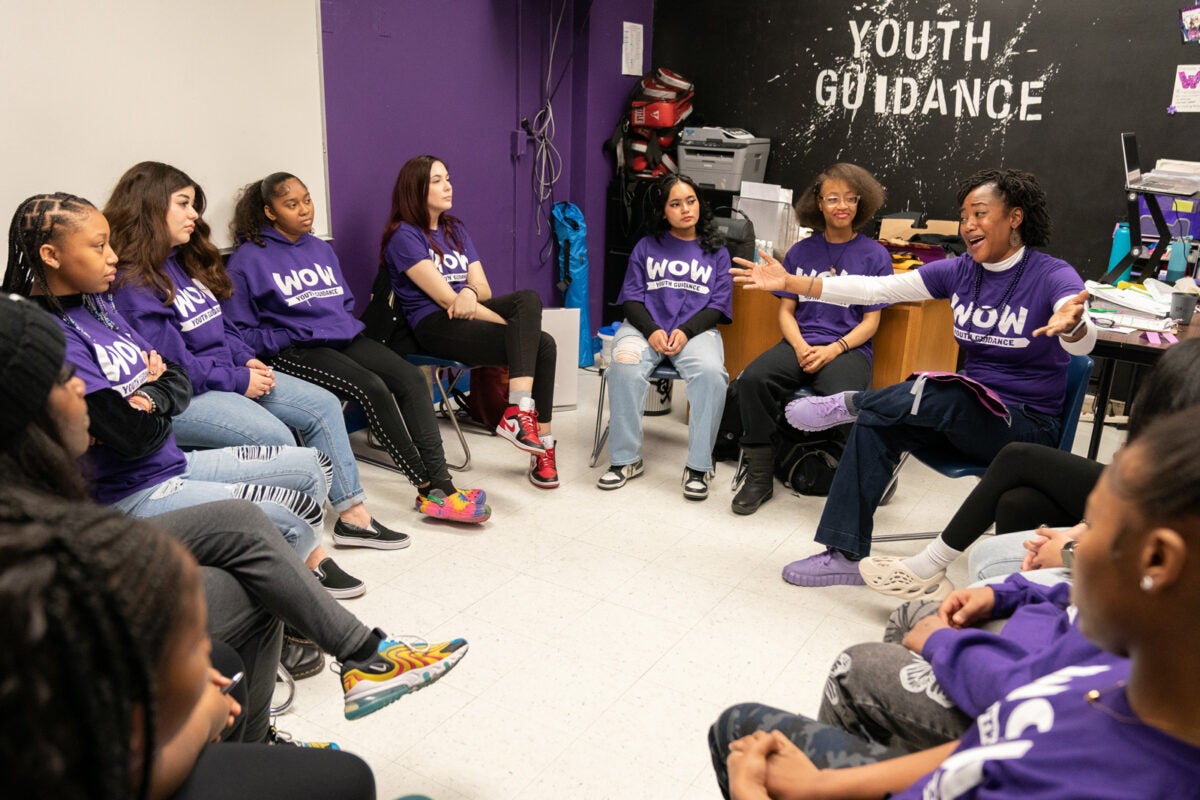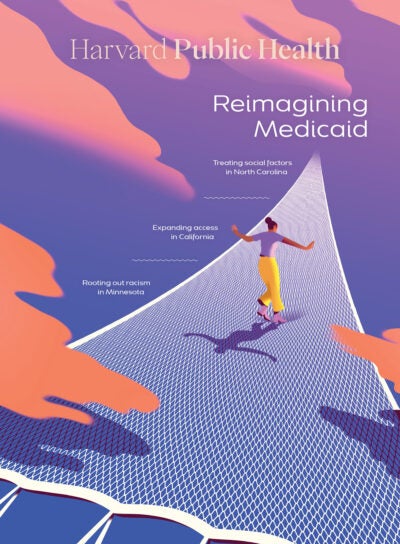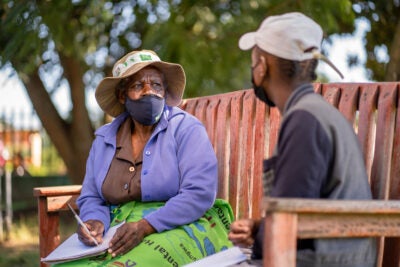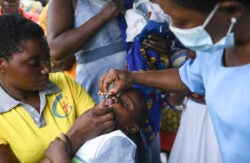News
Fall 2023: Notable news from the world of public health
Here’s Harvard Public Health‘s roundup of notable public health news in the Fall 2023 issue.
A blow against food fraud in Bangladesh

Adisak Mitrprayoon / iStock
Turmeric producers in South Asia widely apply lead chromate to the spice to improve its appearance. But Bangladesh is now an exception, according to a report in Undark. After Stanford University researchers showed turmeric consumption was causing high levels of lead in pregnant Bengali women and their children, the Bangladesh Food Safety Authority took action. It raided a major market in 2019, fined traders with lead-tainted turmeric, and simultaneously launched a campaign warning of the dangers of consuming tainted turmeric. Experts say similar strategies could improve public health in India and Pakistan.
The trust factor

Viktorcvetkovic / iStock
Home visits by community health workers who shared the racial, ethnic, or linguistic background of their pregnant patients—and thus were more likely better able to foster trust—improved pre- and post-natal care, according to a new study in JAMA Pediatrics. The study looked at Medicaid-eligible expectant parents in a home visit program in Michigan. Black mothers gained the most, with a 6 percent drop in their risk of pre- and very-pre-term birth—a small but statistically significant number.
School-based group counseling can boost girls’ mental health

Courtesy of Youth Guidance
High school girls who attended a four-month, school-based group counseling program in Chicago during the 2017-2018 school year saw a 22 percent reduction in the frequency and severity of symptoms of post-traumatic stress disorder, according to a new study in Science Advances. Rates of anxiety dropped nearly 10 percent, and depression dropped 14 percent.
“As we continue to alter the environment, the risk of disease outbreaks are increasing significantly.”
Charles Akataobi Michael, a senior technical officer at the Africa Centres for Disease Control and Prevention, in a ProPublica article analyzing the link between deforestation and potential future Ebola outbreaks
Jimmy Carter’s crusade against Guinea worm

AP Photo
The former president devoted more than 40 years to global health and human rights initiatives. “I would like to see Guinea worm completely eradicated before I die,” he once said.

Forty years ago, there were 3.5 million cases of Guinea worm worldwide. Last year, only 13 cases were recorded in humans.
Driving under diesel’s influence

victorass88 / iStock
Prolonged exposure to diesel exhaust—already believed to cause 8,800 premature deaths annually in the U.S.—may also lead to decreased brain function, impairing reaction times. Researchers at the University of British Columbia exposed 25 healthy adults to two hours of diesel exhaust and two hours of filtered air at different times. Functional magnetic resonance imaging neural scans, captured before and after each visit, revealed that cerebral regions active when people are at rest briefly changed after exposure to the fumes, which slowed reaction times by fractions of a second. On a population level, the researchers say, prolonged diesel exposure could lead to more accidents and fatalities. This is believed to be the first evidence of traffic-derived air pollution’s impact on brain function in a controlled human experiment.
Food as medicine in the fight to stop tuberculosis

Credit: Kailash Kumar / iStock
Researchers have long thought of good nutrition as a weapon against tuberculosis, but India’s RATIONS study—an acronym for Reducing Activation of Tuberculosis by Improvement of Nutritional Status—is the first cluster-randomized trial to examine the relationship. According to The Lancet, randomly selected households with a TB-infected person received food baskets for all residents; incidence of the disease in these households dropped by approximately 40 percent.
“This is the black lung disease of today’s outdoor laborers, and climate change is making it worse.”
Jason Glaser, head of La Isla Network, in Time, on unusual kidney conditions known as chronic kidney disease of non-traditional origin
What’s in your glass?

Seetwo / iStock
Nearly half of all U.S. tap water likely contains one or more “forever chemicals,” according to a new study from the U.S. Geological Survey. Per- and polyfluoroalkyl substances, or PFAS, as they are known, are found in everything from pizza boxes to nonstick cookware to dental floss to fire-fighting foam, and they leach into drinking water over time. PFAS have been linked to an increased risk of some cancers and obesity, and to reduced immune responses, among other health concerns.
“Disgusting black sludge” in the U.S. water supply

KariHoglund / iStock
In other water-related public health news, industry groups have long lobbied the federal government to downplay the risk of manganese, a toxic drinking water contaminant, according to an investigative report from the nonprofit newsroom Public Health Watch. Experts say Environmental Protection Agency safety standards for manganese are influenced by industry-backed research, and that manganese toxicity is linked to developmental and behavioral disorders in children. Lack of regulation and monitoring means manganese may pose a broader threat to U.S. drinking water than previously understood.
The Message, for public health
Hip hop turned 50 earlier this year, and tributes included the public health contributions of pioneering hip-hop artist Doug E. Fresh. He joined forces with Columbia University neurologist Olajide Williams in 2006 to create Hip Hop Public Health, a nonprofit health literacy organization that uses hip-hop songs and videos to advance awareness in underserved communities of everything from dental hygiene to colon cancer screening to managing asthma.
Its musical model is working. A number of studies have found its songs and related K-12 curricula improve awareness and literacy. A 2018 study measured the effects of its stroke preparedness curriculum, which included stroke-awareness hip-hop songs, such as Stroke Ain’t No Joke; a short cartoon; and a video game, among other resources. At the start of the program, two percent of students could demonstrate stroke preparedness; after finishing the three-hour curriculum, that number rose to 57 percent. (Students in the control group showed no change in stroke preparedness.) And 24 percent of the students who took the module retained key information three months later. Hip Hop Public Health has created more than 200 multimedia educational resources and contributes to numerous public health campaigns.
For more public health news, read the rest of our Fall 2023 issue.



